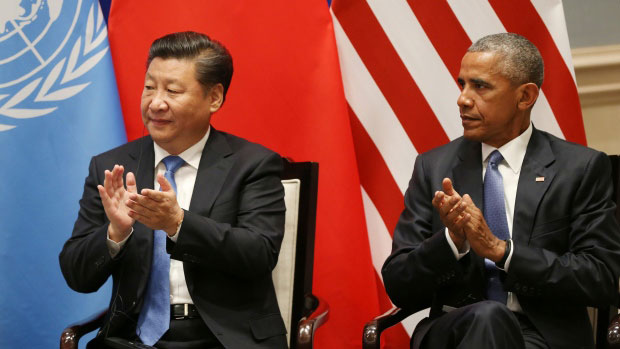
Chinese President Xi Jinping, left, and U.S. President Barack Obama applaud as UN Secretary-General Ban Ki-moon delivers a speech during a joint ratification of the Paris climate change agreement in Hangzhou, China. Photo: AP
Negotiations on a bilateral investment treaty (BIT) between China and the United States have made significant progress thanks to the meeting between Chinese President Xi Jinping and his American counterpart Barack Obama during the 2016 G20 Summit in Hangzhou, China.
The two sides held their 28th round of BIT talks in Beijing on August 21-28 and continued consultations from August 29 to September 3, where both sides exchanged new "negative list" offers, with the common goals of establishing non-discriminatory, transparent and open investment environment through negotiations.
China and the US have promised to support and further improve the work the current and future international financial organizations would do in international affairs, such as environment protection and overall governance.
The two countries also support the reform of quota allocations and overall governance of the IMF which is about to finish the 15th inspection on the quotas before its 2017 annual meeting.
The two sides reiterated that the change of the quota allocations should focus on increasing the shares of more dynamic economies so as to reflect their importance in the global economy.
The US has supported the IMF’s decision to include the Chinese yuan into the SDR currency basket, and the two countries also agreed to carry on more research on the application of SDR, such as the release of financial statistics with SDR as the reporting currency and SDR-denominated bonds.
The two countries also stressed the importance of cooperation on quota review in accordance with the path and schedule put forward by the Board of Governors of the World Bank, and promised to support the economic development of developing countries with the help of international financial organizations.
China and the US also reaffirmed the role of the Paris Club as the official platform for bilateral debt rescheduling, and suggested that the Paris Club expand its membership to new debtors. China would continue to take part in and play a more constructive role in the Paris Club.
(This article is translated and edited by Chunmei.)
| Touched | Sympathetic | Bored | Angry | Amused | Sad | Happy | No comment |